Any novel which opens with an assisted suicide posing as a public art happening is a book after my own heart. Such is the case in Bruce Bauman’s latest work, Broken Sleep, a story which gathers an eclectic band of characters, each involved in their own personal quests and forming a sort of modern day Wizard of Oz. Broken Sleep contains many a scene which may leave readers feeling slightly guilty for laughing. Case in point; the aforementioned opening gambit.
NewPages Blog
At the NewPages Blog readers and writers can catch up with their favorite literary and alternative magazines, independent and university presses, creative writing programs, and writing and literary events. Find new books, new issue announcements, contest winners, and so much more!
Broken Sleep
Spread the word!
Everything I Found on the Beach
Everything I Found on the Beach, by Cynan Jones, begins with police finding a mutilated body on a Welsh beach. What comes next is an unnamed woman opening an envelope, the contents of which fill her with high emotion. I could hardly wait to find out whose body it is and what’s up with the woman.
Spread the word!
Orwell’s Nose
British academic and writer John Sutherland lost his sense of smell three years ago during hay fever season. George Orwell (nee Eric Arthur Blair) apparently suffered from an acute sensitivity to smells, called nasal hyperaesthesia. Pair the two conditions, and Sutherland seized a new way of thinking about Orwell. He cites a quote from Orwell’s book The Road to Wigan Pier, which “contains the four words that have hung like an albatross around Orwell’s neck: ‘The working classes smell.’” From this was born Orwell’s Nose: A Pathological Biography, to be released this year.
Spread the word!
Shock Treatment
If reading about bodily functions, bodily excretions, or strange items put into body orifices offends you, be forewarned, they’ll clobber you in Shock Treatment, the 25th anniversary reissue of Karen Finley’s 1990 book.
Spread the word!
Bilgewater
For Jane Gardam fans, this new reprint of her novel Bilgewater will be a delight, almost as good as Old Filth. For those who don’t know Gardam, you’ll have a wonderful treat. There are some Gardam features which you need to be aware of: sometimes a lot of important information is given in one sentence so you need to be alert; Gardam is British, so sometimes you come across an unfamiliar expression; and this novel has a typical Gardam ending, which took this reviewer three rereads to figure out. But the discovery was fun.
Spread the word!
Amercian Life in Poetry :: Dorriane Laux
American Life in Poetry: Column 591
BY TED KOOSER, U.S. POET LAUREATE
Dorianne Laux, who lives in North Carolina, is one of our country’s most distinguished poets, and here’s a poignant poem about a family resemblance. It’s from her book Smoke, from BOA Editions.
Ray at 14
Bless this boy, born with the strong face
of my older brother, the one I loved most,
who jumped with me from the roof
of the playhouse, my hand in his hand.
On Friday nights we watched Twilight Zone
and he let me hold the bowl of popcorn,
a blanket draped over our shoulders,
saying, Don’t be afraid. I was never afraid
when I was with my big brother
who let me touch the baseball-size muscles
living in his arms, who carried me on his back
through the lonely neighborhood,
held tight to the fender of my bike
until I made him let go.
The year he was fourteen
he looked just like Ray, and when he died
at twenty-two on a roadside in Germany
I thought he was gone forever.
But Ray runs into the kitchen: dirty T-shirt,
torn jeans, pushes back his sleeve.
He says, Feel my muscle, and I do.
We do not accept unsolicited submissions. American Life in Poetry is made possible by The Poetry Foundation (www.poetryfoundation.org), publisher of Poetry magazine. It is also supported by the Department of English at the University of Nebraska-Lincoln. Poem copyright ©2000 by Dorianne Laux, “Ray at 14,” (Smoke, BOA Editions, 2000). Poem reprinted by permission of BOA Editions, Ltd. Introduction copyright ©2016 by The Poetry Foundation. The introduction’s author, Ted Kooser, served as United States Poet Laureate Consultant in Poetry to the Library of Congress from 2004-2006.
Spread the word!
Valley Voices Special Issue :: Michael Anania
 Valley Voices Spring 2015 is a special issue on Michael Anania, guest edited by Michael Antonucci and Garin Cycholl, who write, “Anania’s space is the river, the imagined city – a Chicago of relentless modernity, one capable of reinventing itself and making itself for sale again and again as the waters rise and fall. From here, the poet observes and reflects on this Chicago on the make – a sprawl of fresh water and wind, candy and steel.”
Valley Voices Spring 2015 is a special issue on Michael Anania, guest edited by Michael Antonucci and Garin Cycholl, who write, “Anania’s space is the river, the imagined city – a Chicago of relentless modernity, one capable of reinventing itself and making itself for sale again and again as the waters rise and fall. From here, the poet observes and reflects on this Chicago on the make – a sprawl of fresh water and wind, candy and steel.”
Featured in the volume is an interview with Anania as well as several of his poems. Also included are essays on Anania’s work: “Modernist Current: Michael Anania’s Poetry of the Western Rivers” by Robert Archambeau; “‘Out of Dazzlement’…Chiaroscuro Revisited” by Peter Michaelson; “‘Energy Held in Elegant Control’: Vortex Anania” by Lachlan Murray; “Another Italian-American Poet in Omaha: Italy in Michael Anania’s Poetry” by William Allegrezza; “Michael Anania’s The Red Menace: A Study in Self-Production” by David Ray Vance; “‘Like Hands Raised in Song’: Proper Names in Michael Anania’s ‘Steal Away'” by Lea Graham; “On Michael Anania’s In Natural Light” by Reginald Gibbons as well as several more.
“This collection of essays and original work,” the editors write, “offers a set of moments in lands (and waters) surveyed by Anania. That land pretends a relentless modernity – one that Anania has evidenced for readers, colleagues, and other artists page by page, line by line. Charles Olson argued that the poet either rides on or digs into the land. This collection of essays and Anania’s writings attest that he has done both.”
Spread the word!
Books :: 2014 Tampa Review Prize for Poetry
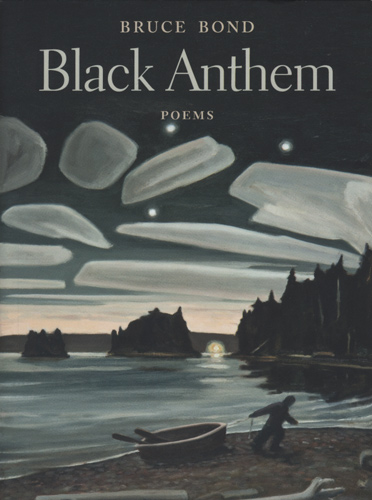 Winner of the 2014 Tampa Review Prize for Poetry, Bruce Bond’s Black Anthem, was published this month. The sonnets in the collection are “wide-ranging in their investigations of the body, the psyche, metaphysical hunger, and its place in human conflict.” Black Anthem is available from the University of Tampa Press website in hardcover and paperback.
Winner of the 2014 Tampa Review Prize for Poetry, Bruce Bond’s Black Anthem, was published this month. The sonnets in the collection are “wide-ranging in their investigations of the body, the psyche, metaphysical hunger, and its place in human conflict.” Black Anthem is available from the University of Tampa Press website in hardcover and paperback.
Spread the word!
2015 Allen Ginsberg Poetry Awards
Issue 44 of Paterson Literary Review annual (2016-2017) features the winners and honorable mentions from their 2015 Allen Ginsberg Poetry Awards:
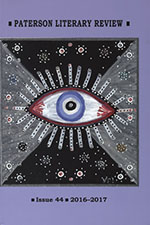 First Prize
First Prize
Ann Clark, Dexter, NY, “Pretend” and Annie Lanzillotto, Yonkers, NY, “Diminished Capacity, an Indictment”
Second Prize
Lynne McEniry, Morristown, NJ, “Splinter”
Third Prize
Maxine Susman, Princeton, NJ, “Thirteen”
A full list of winners and honorable mentions as well as guidelines for this annual contest can be found here.
Spread the word!
Books :: 2015 David Martinson – Meadowhawk Prize
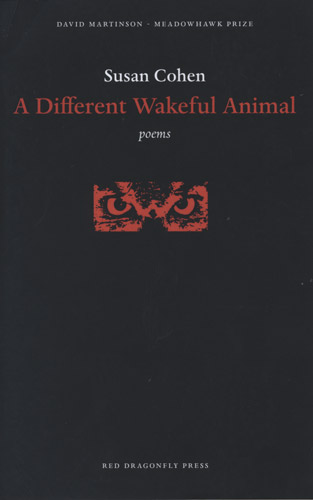 In June, A Different Wakeful Animal by Susan Cohen was published by Red Dragonfly Press. Winner of the 2015 David Martinson – Meadowhawk Prize, A Different Wakeful Animal “takes on the profound questions in language that catches the ear and the imagination. [ . . . ] A Different Wakeful Animal investigates what perishes and what might remain.”
In June, A Different Wakeful Animal by Susan Cohen was published by Red Dragonfly Press. Winner of the 2015 David Martinson – Meadowhawk Prize, A Different Wakeful Animal “takes on the profound questions in language that catches the ear and the imagination. [ . . . ] A Different Wakeful Animal investigates what perishes and what might remain.”
Readers can grab a copy of Cohen’s poetry collection, and writers can still submit to the 2016 David Martinson – Meadowhawk Prize until August 31.
Spread the word!
SRPR Review Essay Feature
Each issue of Spoon River Poetry Review print jounral concludes with “The SRPR Review Essay,” which editors identify as “a long analytical essay (20-25 pp) that blurs the line between the short, opinion-driven review and the academic article. Each review essay is written by an established poet-critic who situates 3-5 new books of contemporary poetry within relevant conversations concerning poetry and poetics. At least half of the books discussed in the review essay are published by small presses.” The most recent issue (41.1) features “The New in the News: Poetry, Authenticity, and the Historical Imagination” by Bruce Bond, and includes critical reviews of The Road In Is Not the Same Road Out: Poems by Karen Solie (Farrar, Straus, and Girous, 2015) and Emblems of the Passing World: Poems after Photographs by August Sander by Adam Kirsch (The Other Press, 2015). A list of recent SRPR review essays can be found here, with some excerpted as well as full text.
Spread the word!
Books :: 2015 Tenth Gate Prize Winner
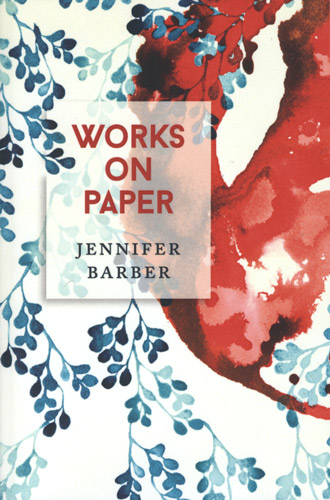 Looking back to May, Jennifer Barber’s Works on Paper was published by The Word Works. Winner of the 2015 Word Works Tenth Gate Prize. Her third poetry collection, Works on Paper “shows us the power of lyric restraint in the hands of a poet who draws from the well of the small moments of motherhood as well as the sweep of Jewish history.” This year’s Tenth Gate Prize just closed earlier in the month, with results announced on October 1st.
Looking back to May, Jennifer Barber’s Works on Paper was published by The Word Works. Winner of the 2015 Word Works Tenth Gate Prize. Her third poetry collection, Works on Paper “shows us the power of lyric restraint in the hands of a poet who draws from the well of the small moments of motherhood as well as the sweep of Jewish history.” This year’s Tenth Gate Prize just closed earlier in the month, with results announced on October 1st.
Spread the word!
2016 Ezra Jack Keats Book Award
 The Ezra Jack Keats Foundation is accepting submissions from publishers for the twenty-seventh annual Ezra Jack Keats New Writer and New Illustrator Book Awards (known collectively as the Ezra Jack Keats Book Award).
The Ezra Jack Keats Foundation is accepting submissions from publishers for the twenty-seventh annual Ezra Jack Keats New Writer and New Illustrator Book Awards (known collectively as the Ezra Jack Keats Book Award).
The awards are designed to recognize and encourage authors and illustrators starting out in the field of children’s books who share Ezra Jack Keats’ commitment to children and diversity. The award is given annually to an outstanding new writer and new illustrator of picture books for children (9 years old and under). Publishers are encouraged to submit works by new writers and illustrators who are committed to celebrating diversity through their writing and art.
To be eligible, writers and illustrators must have had no more than three books published. A selection committee of early childhood education specialists, librarians, illustrators, and experts in children’s literature will review the entries, seeking books that portray the universal qualities of childhood, a strong and supportive family, and the multicultural nature of our world. The award includes an honorarium of $1,000 for each winner.
Deadline: December 15, 2016
Spread the word!
Amercian Life in Poetry :: Carrie Shipers
American Life in Poetry: Column 590
BY TED KOOSER, U.S. POET LAUREATE
As children, just about everyone has experienced the very real fear of an imaginary monster. But what if our mothers could have spoken to our childhood fears? Carrie Shipers of Wisconsin, the author of Family Resemblances: Poems (University of New Mexico Press), depicts just that when a protective mother talks back to her son’s Bogeyman in this fine poem.
Mother Talks Back to the Monster
 Tonight, I dressed my son in astronaut pajamas,
Tonight, I dressed my son in astronaut pajamas,
kissed his forehead and tucked him in.
I turned on his night-light and looked for you
in the closet and under the bed. I told him
you were nowhere to be found, but I could smell
your breath, your musty fur. I remember
all your tricks: the jagged shadows on the wall,
click of your claws, the hand that hovered
just above my ankles if I left them exposed.
Since I became a parent I see danger everywhere—
unleashed dogs, sudden fevers, cereal
two days out of date. And even worse
than feeling so much fear is keeping it inside,
trying not to let my love become so tangled
with anxiety my son thinks they’re the same.
When he says he’s seen your tail or heard
your heavy step, I insist that you aren’t real.
Soon he’ll feel too old to tell me his bad dreams.
If you get lonely after he’s asleep, you can
always come downstairs. I’ll be sitting
at the kitchen table with the dishes
I should wash, crumbs I should wipe up.
We can drink hot tea and talk about
the future, how hard it is to be outgrown.
We do not accept unsolicited submissions. American Life in Poetry is made possible by The Poetry Foundation (www.poetryfoundation.org), publisher of Poetry magazine. It is also supported by the Department of English at the University of Nebraska-Lincoln. Poem copyright ©2015 by Carrie Shipers, “Mother Talks Back to the Monster” (North American Review, Vol. 300, no. 4, 2015). Poem reprinted by permission of Carrie Shipers and the publisher. Introduction copyright ©2016 by The Poetry Foundation. The introduction’s author, Ted Kooser, served as United States Poet Laureate Consultant in Poetry to the Library of Congress from 2004-2006.
Spread the word!
Ragazine.CC – July/August 2016
In this technological age, the ping of a new email can at times seem exhaustive, from weekly ads from every place you’ve ever shopped, to growing piles of submissions and chainmail forwards from your mom. But one email to look forward to is the bimonthly announcement for a new issue of Ragazine.CC. Returning from their six-month hiatus, Ragazine.CC brings more to the table than ever before.
Spread the word!
Zone 3 – Spring 2016
The Spring 2016 issue of Zone 3 opens without preface or fanfare, allowing the writing to speak for itself.
Spread the word!
Black Warrior Review – Spring/Summer 2016
The Black Warrior Review (BWR), published out of the University of Alabama Tuscaloosa, mixes the bizarre with the familiar in issue 42.2. Best summed up by Megan Milks in their chapbook “The Feels”— a legitimization of queer pairing in fanfiction communities—this issue expands “what is possible in both the actual world and the world of the text.”
Continue reading “Black Warrior Review – Spring/Summer 2016”
Spread the word!
Kenyon Review – May/June 2016
The May/June 2016 issue of Kenyon Review is so of-the-moment with its new section of “EcoPoetry,” wherein each poet gives a personal take on the deterioration of the world’s environment. Poetry Editor David Baker showcases 31 poems “awash with warning,” he says. “The devastation and peril often feel so massive they are already beyond words. But in important ways poetry is always about what is beyond mere words, just past our grasp and our understanding.”
Spread the word!
Phoebe – Fall 2015
“A short story should always move forward in time!” and “Use strong action verbs” and “Only leave the words that do the most work emotionally” are phrases former students of Alan Cheuse may have heard often. “He pushed for more drama, more emotion, fewer words,” writes Phoebe Editor-in-Chief Amanda Canupp Mendoza. “He wanted us to live up to our full potential not only as writers, but as humans.” In July of 2015, Alan Cheuse passed away and this issue, in collaboration with Alan Cheuse Literary Review, opens with a special section dedicated to the late George Mason University professor.
Spread the word!
Lorca’s Glowing Moon
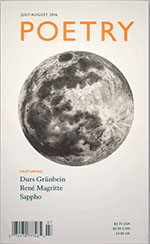 Well, this is a first for me in all the years I’ve been working with literary magazines. The July/August 2016 cover of Poetry is a special treat for those who can access the print version. Artist Chris Hefner has created a glow-in-the-dark moon to celebrate the “moon poems” by Federico García Lorca, translated by Sarah Arvio. The issue features “Two Evening Moons,” “Of the Dark Doves,” and “Ballad of the Moon Moon.” Read more about the translations as well as a statement from the artist about his work and several other images from his collection here.
Well, this is a first for me in all the years I’ve been working with literary magazines. The July/August 2016 cover of Poetry is a special treat for those who can access the print version. Artist Chris Hefner has created a glow-in-the-dark moon to celebrate the “moon poems” by Federico García Lorca, translated by Sarah Arvio. The issue features “Two Evening Moons,” “Of the Dark Doves,” and “Ballad of the Moon Moon.” Read more about the translations as well as a statement from the artist about his work and several other images from his collection here.
Spread the word!
Florida Review 2015 Editors’ Awards
Issue 40.1 of The Florida Review features the winners and finalists of the publication’s 2015 Editors’ Awards. This is an annual contest which awards $1000 to each winner and publication to winners and finalists.
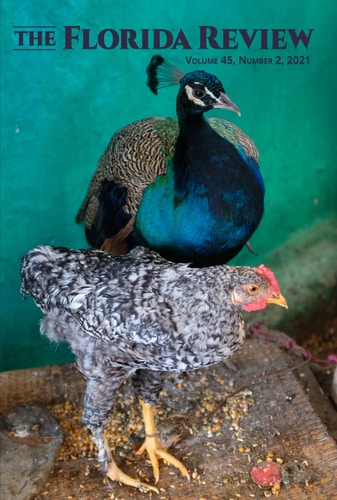 Poetry
Poetry
Winner Christine Poreba for “Negative Miracle”
Finalist Rachel Flynn for “America, February”
Fiction
Winner Matthew Lansburgh for “The Lure”
Finalist Jacob Appel for “The Dragon Declension”
Finalist Miriam Cohen for “Recess Brides”
Creative Nonfiction
Winner Melanie Thorne for “What We Keep”
Finalist Carol Smith for “Tearing Down the House”
Spread the word!
Amercian Life in Poetry :: Sharon Chmielarz
American Life in Poetry: Column 589
BY TED KOOSER, U.S. POET LAUREATE
We hope that you will visit, from time to time, our archived columns at www.americanlifeinpoetry.org, where you may find other poems by the poets we feature. Today’s is the third we’ve published by Sharon Chmielarz. a Minnesota poet with several fine books in print, including The Widow’s House, just released by Brighthorse books.
Fisher’s Club
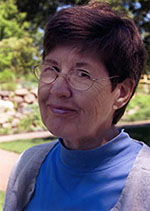 A roadside inn. Lakeside dive. Spiffed up.
A roadside inn. Lakeside dive. Spiffed up.
End of a summer day. And I suppose
I should be smiling beneficently
at the families playing near the shore,
their plastic balls and splashes and chatter.
But my eye pivots left to a couple;
he is carrying her into the water.
He’s strong enough, and she is light
enough to be carried. I see
how she holds her own, hugging
his neck, his chest steady as his arms.
I have never seen such a careful dunk,
half-dunk, as he gives her. That beautiful
play he makes lifting her from the water.
And I suppose I should be admiring
the sunset, all purple and orange and rose now.
Nice porch here, too. Yeah, great view.
But I have never seen such a loving
carrying as he gives her. Imagine
being so light as to float
above water in love.
We do not accept unsolicited submissions. American Life in Poetry is made possible by The Poetry Foundation (www.poetryfoundation.org), publisher of Poetry magazine. It is also supported by the Department of English at the University of Nebraska-Lincoln. Poem copyright ©2015 by Sharon Chmielarz, “Fisher’s Club,” from The Widow’s House (Brighthorse Books, 2015). Poem reprinted by permission of Sharon Chmielarz and the publisher. Introduction copyright ©2016 by The Poetry Foundation. The introduction’s author, Ted Kooser, served as United States Poet Laureate Consultant in Poetry to the Library of Congress from 2004-2006.
Spread the word!
Nimrod International LGBTQIA Issue
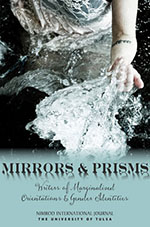 Mirrors & Prisms: Writers of Marginalized Orientations & Gender Identities is the title of Nimrod International‘s Spring/Summer 2016 issue. Editor Ellis O’Neal writes in the editor’s note:
Mirrors & Prisms: Writers of Marginalized Orientations & Gender Identities is the title of Nimrod International‘s Spring/Summer 2016 issue. Editor Ellis O’Neal writes in the editor’s note:
Mirrors & Prisms feature the work of writers who identify as lesbian, gay, bisexual, transgender, queer, intersex, or asexual, or anywhere under the umbrella term MOGAI (marginalized orientations, gender identities, and intersex). While Nimrod has always published the work of such authors (and indeed James Land Jones, Nimrod”s founder, was himself gay and fought for gay rights in Georgia in the 1970s as a professor of literature), we have never before devoted an entire issue to LGBTQIA writers. To do so now, we believe, is not only to continue Nimrod‘s tradition of bringing less-heard writers to the literary forefront, but to make clear what Nimrod has always known: that LGBTQIA writers have stories that can make a differences to all readers, of all sexualities and gender identities.
See the complete table of contents here with links to some works which can be read online.
Spread the word!
The Market Wonders
The Dow that can be named is not the eternal Tao. This is the message of Susan Briante’s great and fun new work The Market Wonders. The economic market is a man made concoction, yet it behaves in an almost random manner that seems to follow rules of nature. In the beginning of the book she quotes, “Blake reminds us, ‘For everything that lives is Holy!’” and sure enough the market seems to be alive. This book associates a volatile reverence to money. The subject is about as transgressive as can be. Most people do not read poetry, half of us that read barely understand it, and certainly, nobody is making a living from it. That is to say, unless you’re Tao Lin or Ben Lerner who undoubtedly have other means of income. The rare Ted Kooser who can make a rock star’s living at poetry is once in a lifetime. But Briante builds a relationship between the flow of the market and the flow of words and poetry. The ticker at the bottom of the book is definitely the philosophical icing on the cake.
Spread the word!
A Crowd of Sorrows
“The body of a child is a playground” -from “Red Rover”
Lisa Anne Gundry’s often sparse lines of poetry about childhood sexual abuse and its lingering effects is haunting. While some of her poems reflect a juvenile attention to the art, Gundry’s grasp of the subject matter is spot on—partly because she lived it and partly because she has clearly carefully researched each phase of her own pain and healing and just as carefully referenced these phases in her work. At 116 pages, A Crowd of Sorrows addresses neither too little or too much, spanning accounts of the abuse, counseling, trauma, and the reactions of family members to her confession that her grandfather was a pedophile who had violated both she and her sister in cars and on couches, during the day and at night.
Spread the word!
Are You Here for What I’m Here For?
Tinged with mystery and magical realism, Brian Booker’s Are You Here for What I’m Here For? is an outstanding collection of self-contained short stories with themes of sleeplessness, sadness, and sickness. The characters, setting, and point of view vary from each story, which demonstrates the wide range of Booker’s fiction writing skills. Furthermore, the stories occur in different, sometimes undeterminable time periods, adding flavor and movement to the reading experience.
Spread the word!
The Sorrows of Young Alfonso
“We live for a brief moment en este valle de lágrimas”
Maybe that’s why there is no resolution in my letters. There is no hero announcing at the end that good will triumph over evil [ . . . ] If my letters were a plea for sanity, then writing them was worthwhile [ . . . ] Remember, the observer of any artistic work changes the work, and in turn is changed by it.
Spread the word!
Return to Arroyo Grande
When filmmakers turn to fiction, plot is always king. Characters and their motivations take a back seat, and the subtle components—the way fiction can get deep inside your mind and play with your inner voice—are often forgotten.
Spread the word!
You Must Fight Them
Maceo Montoya’s You Must Fight Them, a debut collection which begins with the namesake—a ninety-nine-page novella, in which Chicano stereotypes are deciphered, defined, mocked, challenged and rendered in heart-shattering detail—is poignant and entertaining. Montoya’s narrators are mostly bookish and well-educated. They are searching for identity and often do not find what they are expecting. The doctorate student is supposed to be tough and fight the brothers of a girl he worshipped in high school. Why tough? Why fight? Because that is how it is and always will be. Lupita, the girl, wants out of this macho-viciousness, but can’t figure out how. Nothing is cut and dry. Montoya deals with smudged borders and crooked lines.
Spread the word!
Jewish Noir
A short story is the perfect medium for busy people, and Jewish Noir, heralded as the first book of its kind, presents a month’s worth of short stories to delight any reader of the genre. Editor Kenneth Wishnia sums up the lure: “[ . . . ] a majority of the world’s Christians are taught that if you follow the right path, everything will turn out well for you in the end. In Judaism, you can follow the right path and still get screwed (just ask Job). That’s noir.”
Spread the word!
Bittersweet Brick
 Issue #97 of Brick, writes Publisher Nadia Szilvassy, if it had a theme, would be “bittersweet,” as it pays tribute to the life and work of two of the magazines “longtime contributors and dear friends, C. D. Wright and Jim Harrison.” The issue is also the last for Szilvassy as publisher. After over nine years with the magazine, she leaves Editor Laurie D. Graham, Managing Editor Liz Johnston and Designer Mark Byk to steer the publication. “You will…” Szilvassy promises, “find yourselves newly inspiried and delighted.” Farewell Nadia. Our best to you.
Issue #97 of Brick, writes Publisher Nadia Szilvassy, if it had a theme, would be “bittersweet,” as it pays tribute to the life and work of two of the magazines “longtime contributors and dear friends, C. D. Wright and Jim Harrison.” The issue is also the last for Szilvassy as publisher. After over nine years with the magazine, she leaves Editor Laurie D. Graham, Managing Editor Liz Johnston and Designer Mark Byk to steer the publication. “You will…” Szilvassy promises, “find yourselves newly inspiried and delighted.” Farewell Nadia. Our best to you.
Spread the word!
Eight Years of The Write Place at the Write Time
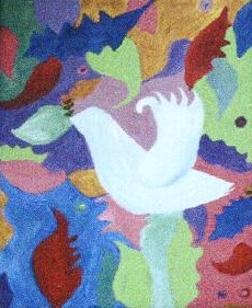 This week marks the eight-year anniversary of online literary magazine The Write Place at the Write Time, founded July 3rd 2008. In those eight years, the journal has been read in 80 countries, and the editors have published 29 issues with over 338 contributors of ranging ages, cultures, and publication credits. More than producing a literary magazine, the editors have also organized projects throughout the years, such as a Filmed Poetry Reading, a Pay-It-Forward Initiative, a Twitter Tales experiment where a group of writers created a story via tweets, and more.
This week marks the eight-year anniversary of online literary magazine The Write Place at the Write Time, founded July 3rd 2008. In those eight years, the journal has been read in 80 countries, and the editors have published 29 issues with over 338 contributors of ranging ages, cultures, and publication credits. More than producing a literary magazine, the editors have also organized projects throughout the years, such as a Filmed Poetry Reading, a Pay-It-Forward Initiative, a Twitter Tales experiment where a group of writers created a story via tweets, and more.
To celebrate the anniversary, check out the Spring/Summer 2016 issue, which includes new fiction, poetry, nonfiction, and art, with an anniversary scrapbook that looks back at past anniversaries. The Writers Craft Box features an opportunity for writers to explore the significance of numbers for a prize, and in interviews, Tracy Chevalier, author of Girl with a Pearl Earring, discusses her latest novel, At the Edge of the Orchard, as well as the themes found in her work.
Happy anniversary, The Write Place at the Write Time. We at NewPages wish you many more years to come.
Spread the word!
Of Rivers Chapbook Special Feature
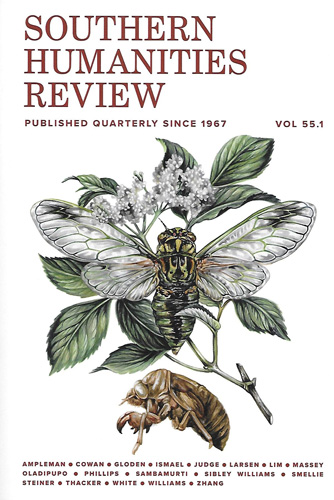 The newest issue of Southern Humaniites Review (v49 n2) includes a special poetry section of selections from Of River, a chapbook edited by Chiyuma Elliot and Katie Peterson, who also each contribute a piece.The entire chapbook is available to read for free online here. The editors open the collection with this explanation:
The newest issue of Southern Humaniites Review (v49 n2) includes a special poetry section of selections from Of River, a chapbook edited by Chiyuma Elliot and Katie Peterson, who also each contribute a piece.The entire chapbook is available to read for free online here. The editors open the collection with this explanation:
We began with Langston Hughes’s 1921 award-winning poem “The Negro Speaks of Rivers” and the charge to write something in response. There was something in the invitation about nature poetry and how that seemed important, but otherwise the instructions were open-ended (perhaps scarily so). We asked poets of very different styles and sensibilities, only some of whom were already engaged with Hughes’s work: F. Douglas Brown, Jericho Brown, Katie Ford, Rachel Eliza Griffiths, Derrick Harriell, Dong Li, Sandra Lim, and Michael C. Peterson. We wanted to see what each of these writers would make. In both the individual poems and the group as a whole, we weren’t disappointed; the poems ask, reach, and posit literary relationship in phenomenally different ways.
Spread the word!
Ready! Set! Write! Poetry Marathon 2016!
 The Poetry Marathon is an annual event that challenges participants to write 24 poems in 24 hour, posting the writing online via a shared WordPress site. This year’s marathon begins at 9 AM EDT on Saturday, August 13, 2016 and ends at 9 AM on Sunday. There is also a half marathon from 9 AM until 9 PM Saturday.
The Poetry Marathon is an annual event that challenges participants to write 24 poems in 24 hour, posting the writing online via a shared WordPress site. This year’s marathon begins at 9 AM EDT on Saturday, August 13, 2016 and ends at 9 AM on Sunday. There is also a half marathon from 9 AM until 9 PM Saturday.
The Poetry Marathon is run (no pun intended) by Caitlin Jans (Thomson) and Jacob Jans, two writers and web publishers living in the Pacific Northwest. There is no charge to participate in the marathon, and in 2015, over 300 writers participated from nearly every continent but one (c’mon Antarctica!).
The Poetry Marathon website has an FAQ that answers the burning questions, like: How do I prepare for the Marathon? What if I can’t be at a computer all day? What happens to the poems once I post them? and more. The site also features blog posts from previous participants who offer commentary on their marathon experience.
This year, the organizers plan to publish a Poetry Marathon Anthology of poems written during the marathon.
Spread the word!
10th Annual August Poetry Postcard Festival
The tenth annual August Poetry Postcard Festival opens for registration on July 4, 2016!
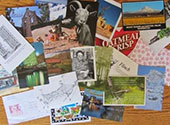 For you newbies, the August PoPo Fest goes like this: You sign up. You get a list of 31 names/addresses of other people who signed up. Starting late July, you write a poem a day on a postcard and mail it off to the next person on the list, so by the end of the month, you will have (hopefully) written and sent 31 poems and (hopefully) received 31 poems.
For you newbies, the August PoPo Fest goes like this: You sign up. You get a list of 31 names/addresses of other people who signed up. Starting late July, you write a poem a day on a postcard and mail it off to the next person on the list, so by the end of the month, you will have (hopefully) written and sent 31 poems and (hopefully) received 31 poems.
The poems are not supposed to be pre-written or something you’ve been working on for months. This is an exercise is the spontaneous, the demanding, the gut-driven, the postcard inspired – whatever it is that gets you to write once a day, each day, and send it off into the world.
New this year: poems from this year’s fest can be submitted for the 1st Poetry Postcard Fest Anthology, a project led by three volunteers.
I’ve done this event since it began! I don’t always keep to a poem a day; sometimes I get ahead one day, or catch up another, with several poems in one day. But I try my best. The event does get me thinking of poetry in my every day, when I rarely have time for it, and writing it down – something I have time for even more rarely.
I’ve received poems from across the state, the country and around the globe. I’ve gotten postcards made from cereal boxes, some with gorgeous original artwork, and lots of the lovely tacky tourist cards from travel destinations. I have cards from “famous” poets, and some who have since become more famous, and some never signed, so I’ll never know, and it hardly matters. I’ve gotten poetry. Sent to me directly. From strangers. Lovely, strange, absurd, and funny. Poetry.
It’s an amazing event, and I hope you will take the challenge and join in this year. For the first time EVER, the organizers have decided to charge a nominal fee for the event ($10). I can only imagine the amount of work it is to run this (with up to 300 people participating), and keeping up virtual space to promote it. I’m not dissuaded by the fee, knowing the extraordinary event that it is, and knowing I’ve spent 100 times that on conferences from which I’ve gotten a great deal less inspiration…
So, please writers, wanna-bes and needs-a-kick-in-the-arsers, poetry lovers, postcard lovers – this event is for you. Join us!
Spread the word!
Portable Stories Inaugural Contest Winner
 Every four months, Portable Stories holds a short story writing contest based on a theme. The winning story is then recorded by a narrator at CDM Sound Studios and posted online along with a behind-the-scenes video about the winning story. There is a $10 entry fee, and the winning author receives $250, or 75% of the proceeds generated from story submissions (whichever is greater). Listeners can download the story for free or make a contribution to one of several featured organizations.
Every four months, Portable Stories holds a short story writing contest based on a theme. The winning story is then recorded by a narrator at CDM Sound Studios and posted online along with a behind-the-scenes video about the winning story. There is a $10 entry fee, and the winning author receives $250, or 75% of the proceeds generated from story submissions (whichever is greater). Listeners can download the story for free or make a contribution to one of several featured organizations.
“How You Like”, by Jari Chevalier [pictured], is the winning story for the inaugural Portable Stories contest theme: HUNGER. This story was performed by January LaVoy and runs 23 minutes 52 seconds.
Spread the word!
Words Without Borders Campus Expansion
 Words Without Borders promotes cultural understanding through the translation, publication, and promotion of the contemporary international literature. Words Without Borders Campus brings that literature to high school and college students, teachers, and professors. On their website, you’ll find fiction, poetry, and essays from around the world, along with resources for understanding it, ideas for teaching it, and suggestions for further exploration.
Words Without Borders promotes cultural understanding through the translation, publication, and promotion of the contemporary international literature. Words Without Borders Campus brings that literature to high school and college students, teachers, and professors. On their website, you’ll find fiction, poetry, and essays from around the world, along with resources for understanding it, ideas for teaching it, and suggestions for further exploration.
Most of the literature presented comes from the online magazine, Words without Borders. Words Without Borders Campus is asking for your help to reach more students and add new countries and literature to their site. With their collections of literature from Mexico, China, Egypt, and Japan, WWB Campus has already reached more than 1,500 high school and college students in the United States and throughout the world, with access to their site remaining completely free.
To take their program to the next level, WWB Campus is asking its supporters — readers, educators, and even students – for help with a new crowd-funding campaign and to spread awareness of WWB Campus. WWB Campus would like to double the number of students reached, adding new features to the website, and introducing literature from more countries (Russia, Iran, and West Africa are in the plans). For more information about how you can help, visit the WWB Campus website. You don’t have to donate money – using the site and spreading the word about it helps too – #InspireGlobalReaders!
Spread the word!
Amercian Life in Poetry :: Peter Everwine
American Life in Poetry: Column 587
BY TED KOOSER, U.S. POET LAUREATE
Someone told about a blind man who stood at a busy intersection, waving toward all the passing cars. When asked why he did that, he said that there might be someone in one of those cars whom he knew and he didn’t want to miss the opportunity. Peter Everwine, a California poet, here gives us another such waver, from his book Listening Long and Late, from the University of Pittsburgh Press.
 The Girl on the Bullard Overpass
The Girl on the Bullard Overpass
The girl on the Bullard overpass
looks happy to be there, getting soaked
in a light rain but waving her hands
to the four o’clock freeway traffic
in which I’m anything but happy.
You might think she’s too dumb
to come in out of the rain, but rain
or shine, it doesn’t seem to matter.
She’s there most every afternoon,
as if she does this for a living.
Some living, I’d say. Doesn’t she ever
get bored, or wish someone would stop
and say, “Where to?” and her life would change?
That’s how I’d be, hating the noise,
the stink of exhaust, the press of people.
I can’t imagine what her life is;
mine is confused and often fretful.
But there’s something brave about standing alone
in the rain, waving wild semaphores
of gladness to impatient passersby
too tired or preoccupied to care.
Seeing her at her familiar station
I suddenly grin like a fool, wave back,
and forgive the driver to my right,
who is sullen and staring as I pass.
I find her in my rear-view mirror,
then head for a needed drink and supper.
I don’t know where she goes, but I hope
it’s to a place she loves. I hope the rain
lets up. I hope she’s there tomorrow.
American Life In Poetry does not accept unsolicited submissions. American Life in Poetry is made possible by The Poetry Foundation (www.poetryfoundation.org), publisher of Poetry magazine. It is also supported by the Department of English at the University of Nebraska-Lincoln. Poem copyright ©2004 by Peter Everwine, “The Girl on the Bullard Overpass,” from Listening Long and Late (University of Pittsburgh Press, 2013). Poem reprinted by permission of Peter Everwine and the publisher. Introduction copyright ©2016 by The Poetry Foundation. The introduction’s author, Ted Kooser, served as United States Poet Laureate Consultant in Poetry to the Library of Congress from 2004-2006.
Spread the word!
Glimmer Train Fiction Open Winners
Glimmer Train has just chosen the winning stories for their March/April Fiction Open competition. This competition is held twice a year and is open to all writers. Stories generally range from 3000-6000 words, though up to 24,000 is fine. The next Fiction Open will take place in July. Glimmer Train’s monthly submission calendar may be viewed here.
 First place: Taiyaba Husain [pictured], of Mumbai, India, wins $3000 for “How You Respond in an Emergency.” Her story will be published in Issue 99 or 100 of Glimmer Train Stories. This is Taiyaba’s very first published story!
First place: Taiyaba Husain [pictured], of Mumbai, India, wins $3000 for “How You Respond in an Emergency.” Her story will be published in Issue 99 or 100 of Glimmer Train Stories. This is Taiyaba’s very first published story!
Second place: Edward Porter, of Oakland, CA, wins $1000 for “Storm Dogs” and publication in a future issue of Glimmer Train Stories.
Third place: Anne Vinsel, of Salt Lake City, UT, wins $600 for “Goyische Turkey with Post-its.”
A PDF of the Top 25 winners can be found here.
Deadline soon approaching!
Short Story Award for New Writers: June 30
This competition is held quarterly and is open to all writers whose fiction has not appeared in a print publication with a circulation over 5000. No theme restrictions. Most submissions to this category run 1500-5000 words, but can go up to 12,000. First place prize wins $2500 (increased from $1500!) and publication in Glimmer Train Stories. Second/third: $500/$300 and consideration for publication. Click here for complete guidelines.
Spread the word!
The Louisville Review :: Kid’s Corner Spring 2016
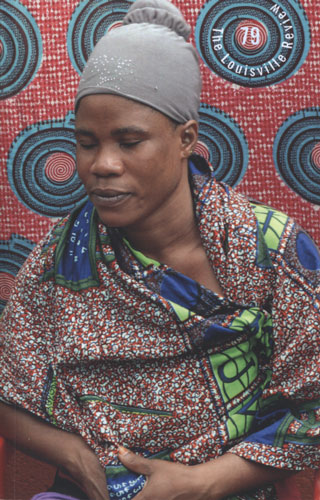 The Louisville Review accepts submissions from students in grades K-12 to feature in “The Children’s Corner” section of the journal. In the Spring 2016 issue, four young writers were published:
The Louisville Review accepts submissions from students in grades K-12 to feature in “The Children’s Corner” section of the journal. In the Spring 2016 issue, four young writers were published:
Kate Busatto, “The Communion”
Kiran Damodaran, “Collision Theory”
Andrew D. Swann, “Jelly Dreams,” “God Didn’t Make the World Round,” and “Worn and Broken”
Isabel Young, “Our Romance is Kamikaze:”
Get a copy of The Louisville Review to check out these new writers.
Spread the word!
Poetry Magazine June 2016 Cover Art
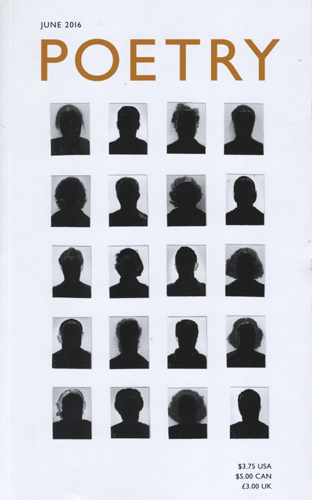 The June 2016 issue of Poetry features cover art by Anna Maria Maiolino. On Harriet: The Blog, Fred Sasaki provides more information about this artist who, it turns out, also creates visual and written poetry with all her works considered to be “poetic actions.”
The June 2016 issue of Poetry features cover art by Anna Maria Maiolino. On Harriet: The Blog, Fred Sasaki provides more information about this artist who, it turns out, also creates visual and written poetry with all her works considered to be “poetic actions.”
Maiolino speaks about her series Photopoemaction, from which the June 2016 cover art comes:
“The photographic series Fotopoemação is a result of the elaboration of images that emerged from my written poems. [ . . . ] These series, other than constituting a challenge to the poetic labour, are efficient instruments of both innovation and freedom. They result from thinking about the things of the world, from the attempt to transform what we live through into consciousness in a poetic operational movement of conduct.”
Check out the full blog post to read more, or stop by the Poetry webpage to listen to this month’s podcast and check out the work inside the June 2016 issue.
Spread the word!
Ninth Letter’s 2015 Literary Award Runners-Up
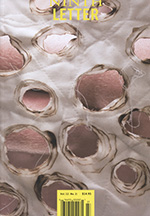 Among the blue-font decorated pages of the latest issue of Ninth Letter, readers will find an art feature and interview with Bert Stabler and Katie Fizdale, a look at Detroit by Caitlin McGuire in the “Where We’re At” section, and the 2015 Literary Award Runners-Up, listed below.
Among the blue-font decorated pages of the latest issue of Ninth Letter, readers will find an art feature and interview with Bert Stabler and Katie Fizdale, a look at Detroit by Caitlin McGuire in the “Where We’re At” section, and the 2015 Literary Award Runners-Up, listed below.
Creative Nonfiction:
Julie Marie Wade, “The Regulars”
Fiction:
Zach VandeZande, “Status Updates”
Poetry:
Monica Sok, “Here Is Your Name”
Rachael Katz, “All About Flash”
Check out all the other goodies inside this new, shiny (no, really, it’s literally shiny) issue of Ninth Letter and grab yourself a copy.
Spread the word!
RHINO 2016 Prize Winners
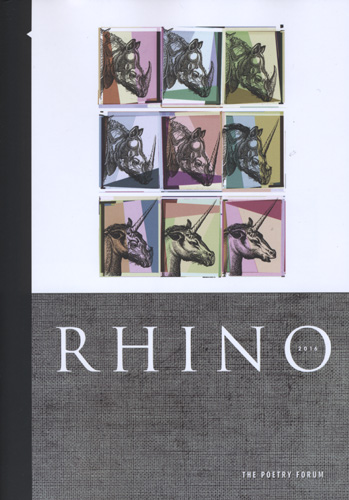 The 2016 issue of RHINO is out and includes the 2016 Editors’ Prize winners and the 2016 Founders’ Prize winners inside.
The 2016 issue of RHINO is out and includes the 2016 Editors’ Prize winners and the 2016 Founders’ Prize winners inside.
Editors’ Prizes 2016:
First Prize
Lee Sharkey, “Tashlich”
Second Prize
Catherine Wing, “Report from the Neandertal Mind”
Honorable Mention
Teresa Dzieglewicz, “Stranger, thank you for giving me this body”
Translation Prize
Anonymous translated from the Anglo-Saxson by Bill Christopherson, “The Seafarer”
Founders’ Prize 2016:
First Prize
Greg Grummer, “The Great Butterfly Collapse”
Runners-Up
Katie Hartsock, “On the Heat of Upstate Travel in the Advancing Polar Air”
Teresa Dzieglewicz, “St. Maria Goretti speaks to the girl”
Readers can find these poems on the RHINO website, with a full table of contents linking to the writers’ websites.
Spread the word!
december’s 2016 Jeff Marks Memorial Poetry Prize Winners
 The Spring/Summer 2016 issue of december features the winner and finalists of the Jeff Marks Memorial Poetry Prize (with submissions opening back up in autumn). This year, the magazine received over 1,200 contest entries, which were then narrowed down to 20 semi-finalists. From these selections, judge Marge Piercy selected the following for the winner, honorable mentions, and finalists.
The Spring/Summer 2016 issue of december features the winner and finalists of the Jeff Marks Memorial Poetry Prize (with submissions opening back up in autumn). This year, the magazine received over 1,200 contest entries, which were then narrowed down to 20 semi-finalists. From these selections, judge Marge Piercy selected the following for the winner, honorable mentions, and finalists.
First Place:
Jim Dwyer, “Enlightenment”
Honorable Mention:
Kate Gray, “Reassurance” and “For Every Girl”
Finalists:
José Angel Araguz, “Cazar Means to Hunt Not to Marry”
Debbie Benson, “Uchi Vallai”
Kierstin Bridger, “Preparing to Sink”
Tova Green, “March Storm at Abbots Lagoon”
John McCarthy, “What I mean When I Say I Don’t Box Anymore”
M.H. Perry, “Cardamom, Osprey, Banff, Us”
Cocoa M. Williams, “Leda on a Stoop in St. Bernard Projects (1974)”
Grab a copy of december’s Spring/Summer 2016 issue to read these poems.
Spread the word!
The Aurorean – Spring/Summer 2016
Issues of The Aurorean give readers glimpses into the seasons, the Spring/Summer 2016 issue sporting a bold, bright cover photograph of magenta petals. The flyleaf is a light, complementary pink, bringing forth the fresh feelings of spring and new flowers.
Spread the word!
Posit – June 2016
Carl Heyward’s “Box/SING” is featured as the cover art for the 10th issue of Posit. The colorful, chaotic mixed media collage has been aptly chosen to greet readers, representing the work found in the new issue: the poetry, prose, and art all sing while pulling no punches.
Spread the word!
Epiphany – Fall 2015
Epiphany’s mission statement describes the word epiphany as a “moment of sudden revelation.” Combine that with this issue’s theme—pent up humanity—and the options are tantalizing. Writers respond with reflections on the various meanings of ‘pent up’: feelings that are restrained, confined, or bottled up. Some of those feelings may ultimately, though not always, explode.
Spread the word!
The Wallace Stevens Journal – Spring 2016
Wallace Stevens (1879-1955) is getting a lot of attention lately in The Atlantic, The New Yorker, Harper’s and other publications featuring reviews of Paul Mariani’s book The Whole Harmonium: The Life of Wallace Stevens. So what better time to check out The Wallace Stevens Society’s publication titled—you guessed it—The Wallace Stevens Review, which not surprisingly carries a review of Mariani’s book.
Continue reading “The Wallace Stevens Journal – Spring 2016”
Spread the word!
The Conium Review – 2015
The design of The Conium Review itself has a simple beauty. The design element of octopus tentacles wrap the outside white cover, and is repeated inside for each story title page. On the flipside of the story title pages, readers see what was on its other side, backwards and fading, as if looking out from inside a shop’s window—inviting readers to enter into the story to look at it from the inside out.
Spread the word!
Apogee – 2015
If you’re looking for something to read that departs from the literature written about white folk by white men, you need to pick up a copy of the latest issue of Apogee. Rife with culture and social commentary and a myriad of international authors both male and female, Apogee delivers a collection of fiction, poetry, nonfiction, and art that I simply did not want to end.
